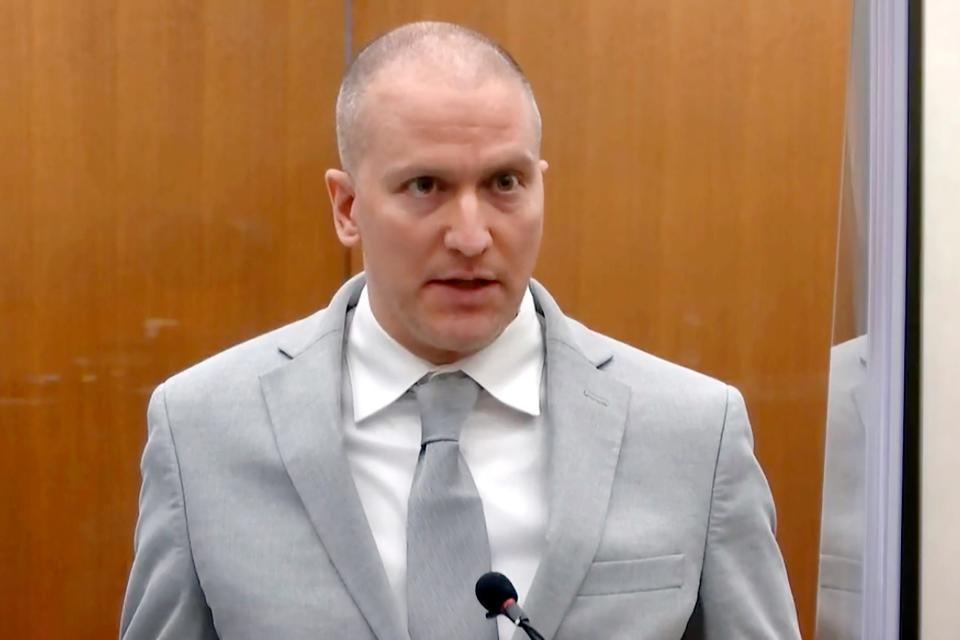Massive system failure: There is no excuse for the prison stabbing of Derek Chauvin
- Oops!Something went wrong.Please try again later.
This shouldn’t be hard, right?
Any freshman criminal-justice major still clutching his or her class schedule could have answered the question:
Which prison inmate in America has the biggest target on his back?
Well, that would be the man who killed George Floyd.
That would be the cop who put his knee in the back of Floyd as Floyd gasped for air and begged for his life and then for his mother.
An inmate stabbed Chauvin in Tucson
Any freshman could have deduced that Derek Chauvin, the Minneapolis police officer convicted of murdering Floyd in the second degree and violating his civil rights, would be the inmate who had better watch his back.
But somehow that eluded the brain trust of the United States federal prison system.
Because at about 12:30 p.m. on Friday at the Federal Correctional Institution in Tucson, that system broke down so spectacularly that another inmate was able to arm himself with a sharp instrument and stab Chauvin until he was seriously injured and needed life-saving hospital care, according to the Minnesota Attorney General’s Office.
Chauvin is still in the hospital today and expected to survive, unnamed sources have told The New York Times.
Unlikely to survive are the careers of federal prison officials who let this happen — who believed you could put Chauvin in an environment with other prisoners and ensure his safety.
Derek Chauvin needed extra protection

Consider the facts that told you otherwise — that would have told any college freshman that Derek Chauvin needed extraordinary protection.
Chauvin’s crime was captured on more than nine minutes of excruciating cellphone video.
That video became the A-roll of every national and local newscast for a week and B-roll for months thereafter.
The murder of George Floyd provoked a cultural revolution that led to protests and riots and burning streetscapes in cities across America.
As an ex-cop, Derek Chauvin was automatically a target for other prisoners — a convicted sheep in a den of wolves.
Finally, there’s the matter of deduction.
Other high-profile inmates have died
Derek Chauvin has the biggest target on his back because so many of the other most notorious prisoners with targets on their backs were either murdered or died by suicide while under the auspices of the geniuses who manage our federal prison system:
Whitey Bulger, the famous Boston mob boss, was beaten to death in 2018 with a padlock by fellow prisoners shortly after he was moved into the general population at the U.S. Penitentiary in Hazelton, W.V.
Jeffrey Epstein, who famously sex trafficked and abused young girls, was found dead in 2019 at the Metropolitan Correctional Center in Manhattan. A Justice Department investigation concluded “a combination of negligence, misconduct and outright job performance failures” allowed him to hang himself in his cell, The New York Times reported.
Theodore J. Kaczynski, better known as the “Unabomber,” died by suicide in June of this year at a federal prison medical center in North Carolina.
It's a massive prison system failure
These are massive failures of the federal prison system, which apparently cannot be trusted to incarcerate high-profile inmates.
Chauvin was stabbed in Tucson while in a “dropout yard” or special protective unit within the Federal Bureau of Prisons, Joe Rojas, a recently retired president of the local union representing workers at a federal prison near Coleman, Fla., told The Times.
That unit houses “informants, people convicted of sex crimes, former gang members and former law enforcement personnel,” The Times reported.
Is this justice? Chauvin's trial wasted money, time
In its coverage of the breakdown of security for high-profile inmates, The Times reported that federal prisons are struggling with an exodus of employees, who find better jobs in the private sector.
John H. Hinderaker, a retired Minnesota attorney and co-founder of the conservative Powerline blog, has followed Chauvin’s case closely and wrote on Saturday that Chauvin knew his life would be in danger.
“After he was convicted, Chauvin’s lawyer requested that he be isolated from other inmates, foreseeing the likelihood of an assassination attempt. That request was denied, presumably because the authorities did not want to seem to be giving Chauvin special treatment.”
This stuff launches conspiracy theories
When you fail to protect the lives of your most endangered inmates, you not only violate their rights to serve out their punishment in a secure and safe environment, you also launch a thousand conspiracy theories.
To this day, millions of Americans believe Jeffrey Epstein was murdered and that the federal prisons may have played a role.
A 2019 Rasmussen poll showed that 42% of those surveyed believed Epstein was murdered “to prevent him from testifying against powerful people with whom he associated.” Only 29% believed he actually died by suicide.
Breakdowns in our justice system are corrosive and undermine all of the institutions that serve that system from law enforcement to prosecutors to the courts to the prisons.
On Friday a prisoner was stabbed in Arizona.
All weekend, the internet was alive with conspiracies that our justice system had railroaded Derek Chauvin.
You can ignore this problem or you can fix it. But you can’t likely fix it with the people who have bungled the last four high-profile cases.
An overhaul is in order.
Phil Boas is an editorial columnist with The Arizona Republic. Email him at phil.boas@arizonarepublic.com.
This article originally appeared on Arizona Republic: Derek Chauvin was stabbed in Tucson, in yet another prison failure

